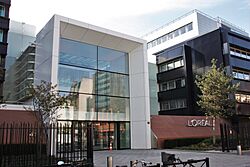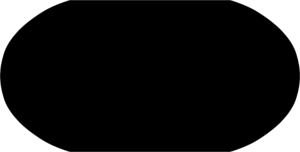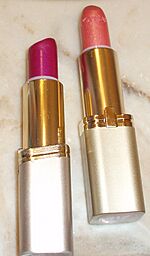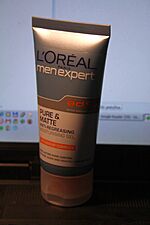L'Oréal facts for kids

L'Oréal's headquarters in Clichy, France
|
|
| Public | |
| Traded as | Euronext Paris: OR CAC 40 component |
| ISIN | ISIN: [https://isin.toolforge.org/?language=en&isin=FR0000120321 FR0000120321] |
| Industry | Consumer goods |
| Founded | 30 July 1909 |
| Founder | Eugène Schueller |
| Headquarters |
,
France
|
|
Area served
|
Worldwide |
|
Key people
|
|
| Products |
|
| Revenue | |
|
Operating income
|
|
| Total assets | |
| Total equity | |
|
Number of employees
|
90,000 (2024) |
| Subsidiaries |
|
L'Oréal S.A. is a big French company that makes personal care products. It's based in Clichy, France, near Paris. L'Oréal is known as the world's largest cosmetics company. They make many products to help people look and feel good.
Contents
History of L'Oréal
How L'Oréal Started
In the early 1900s, a young French chemist named Eugène Schueller created a special hair dye. He called it l'Auréale. Eugène made his own products and sold them to hairdressers in Paris.
On July 31, 1909, he officially started his company. It was first called the "Safe Hair Dye Company of France." Later, this company became L'Oréal. In 1920, L'Oréal had three chemists. By 2021, the company had over 85,000 employees around the world.
L'Oréal began by selling hair dyes. But soon, they started making many other beauty products. By 2020, L'Oréal sold products for hair color, hair styling, skin care, makeup, and perfumes. You can find their products in many places, like hair salons, perfume shops, and supermarkets.
Recent Growth and New Brands
L'Oréal has grown a lot by buying other companies. In 2006, they bought the cosmetics company The Body Shop. In 2008, they acquired YSL Beauté.
In 2014, L'Oréal bought a big Chinese beauty brand called Magic Holdings. They also bought NYX Cosmetics to make their makeup range stronger in North America. That same year, L'Oréal acquired the Brazilian hair care company Niely Cosmeticos Group. They also bought the multi-cultural brand Carol's Daughter.
In 2016, L'Oréal acquired IT Cosmetics. In 2017, the founder's daughter, Liliane Bettencourt, passed away. Her daughter, Françoise Bettencourt Meyers, took over the business.
In 2018, L'Oréal bought ModiFace, a company that uses technology to help people try on makeup virtually. They also started a new partnership with Valentino for beauty and fragrance products. In 2020, they acquired Takami Co, a Japanese skincare brand.
In 2021, L'Oréal bought Youth to the People, a vegan skincare brand. By 2022, L'Oréal owned 36 different brands.
In April 2023, L'Oréal purchased the Australian luxury cosmetics brand Aesop. In December 2023, they acquired Lactobio, a Danish research company. In 2024, L'Oréal acquired Gjosa, a Swiss company focused on water-saving technology. They also signed a deal with Miu Miu to create luxury beauty products.
In August 2024, L'Oréal opened a new research center in India. In December 2024, L'Oréal bought a part of Gowoonsesang Cosmetics, a Korean company known for its Dr.G brand. In March 2025, L'Oréal sold the hair care brand Carol's Daughter. In June 2025, L'Oréal agreed to buy the haircare brand Color Wow.
How L'Oréal Works
L'Oréal's Main Offices
L'Oréal Group has its main office in Clichy, France, near Paris. This building was built in the 1970s. About 1,400 employees work there.
L'Oréal also has offices in other parts of the world:
- L'Oréal USA: Based in New York City, it handles operations in North and South America.
- L'Oréal Canada: Based in Montreal, Canada.
- L'Oréal Australia: Its main office is in Melbourne.
- L'Oréal Nordic: Its main office is in Copenhagen, Denmark.
- L'ORÉAL Deutschland GmbH: Its main office is in Düsseldorf, Germany.
Research and Development
L'Oréal has 21 research and development centers around the world. Three main centers are in France. They also have six regional centers. These are in places like Clark, USA; Kawasaki, Japan; Shanghai, China; Mumbai, India; Rio de Janeiro, Brazil; and Johannesburg, South Africa. These centers help create new and improved products.
Company Leadership
Jean-Paul Agon is the chairman of L'Oréal. Nicolas Hieronimus is the chief executive officer (CEO). Françoise Bettencourt Meyers and Paul Bulcke are vice chairmen on the company's board of directors.
As of December 31, 2023, the Bettencourt family owns about 34.73% of L'Oréal's shares. Other large owners include international investors and Nestlé.
Company Numbers
L'Oréal is a very successful company. Its total sales (revenue) were €41.183 billion in 2023. The company's net income (profit) was €6.184 billion in 2023. L'Oréal had 87,264 employees in 2022.
L'Oréal's Brands
L'Oréal has many different brands. These brands are grouped by the types of customers they serve. Some are for everyday use, some for professionals, and some are luxury brands.
Consumer Products Division
- Essie
- Garnier
- Maybelline
- NYX Cosmetics
- Mixa
- L'Oréal Paris
- La Provençale
L'Oréal Luxe Division
- Aesop
- Biotherm
- Cacharel
- Clarisonic (Stopped selling in 2020)
- Diesel
- Giorgio Armani Beauty
- Guy Laroche
- Helena Rubinstein
- Kiehl's
- Lancôme
- MUGLER
- Paloma Picasso
- Proenza Schouler
- Ralph Lauren Fragrances
- Shu Uemura
- Urban Decay
- Valentino Beauty
- Viktor & Rolf
- Yves Saint Laurent Beauté
- Prada
Professional Products Division
- Kérastase (created by L'Oreal in 1964)
- PureOlogy Research (acquired by L'Oreal in 2007)
- Redken 5th Avenue NYC (acquired by L'Oreal in 1993)
- Shu Uemura Art of Hair
- Carol's Daughter
- Essie (acquired by L'Oreal in 2010)
Active Cosmetics Division
- Vichy cosmetics|Vichy
- La Roche-Posay
- Skinceuticals
- Roger&Gallet (sold in 2020)
- Sanoflore
- Dermablend
- AcneFree
- Skinbetter Science
- Ambi
- CeraVe
- Logocos (since 2018)
Marketing and Advertising
L'Oréal has been an official partner of The Cannes Film Festival since 1997. Many L'Oréal beauty ambassadors, like famous actors and models, walk the red carpet at this film festival.
L'Oréal's famous advertising slogan, "Because I'm worth it," was created in 1973. Later, it changed to "Because you're worth it" and then to "Because we're worth it."
In 2012, L'Oréal opened a very large factory in Indonesia. This factory helps produce products for both Indonesia and other countries. In 2020, L'Oréal saw a big increase in online sales, which helped the company a lot when physical stores were closed.
L'Oréal's Spokespeople
L'Oréal Paris has a group of famous people who represent their brand. They are called the L'Oréal Paris "Dream Team."
- Laetitia Casta (1998–present)
- Aishwarya Rai (2004–present)
- Eva Longoria (2005–present)
- Blake Lively (2013–present)
- Helen Mirren (2014–present)
- Luma Grothe (2015–present)
- Soo Joo (2015–present)
- Aja Naomi King (2017–present)
- Camila Cabello (2017–present)
- Elle Fanning (2017–present)
- Amber Heard (2018–present)
- Andie MacDowell (2018–present)
- Duckie Thot (2018–present)
- Jaha Dukureh (2018–present)
- Céline Dion (2019–present)
- Cindy Bruna (2020–present)
- Katherine Langford (2020–present)
- Aditi Rao Hydari (2020–present)
- Viola Davis (2021–present)
- Kate Winslet (2021–present)
- Yseult (2021–present)
- H.E.R. (2022–present)
- Anushka Sharma (2022–present)
- Thuso Mbedu (2023–present)
- Kendall Jenner (2023–present)
- Cody Simpson (2023–present)
- Mary Fowler (2024–present)
- Simone Ashley (2024–present)
- Temi Otedola (2024–present)
- Alia Bhatt (2024–present)
L'Oréal's Social Responsibility
Animal Testing Alternatives
L'Oréal has invested a lot of money, over €900 million, into finding ways to test products without using animals. They use methods like reconstructed skin models in their research centers. However, in some countries, like China, certain beauty products still need animal testing to be sold. L'Oréal is part of groups that ask for more research into these alternative testing methods.
Recycling Plastic
In 2020, L'Oréal started working with a French company called Carbios. Their goal is to find a way to break down plastic waste using special enzymes. This helps with plastic recycling.
Support During the Ukraine War
In 2022, L'Oréal Paris donated €1 million to charities helping people affected by the 2022 Russian invasion of Ukraine. L'Oréal Paris also stopped most of its business activities in Russia. The company provides hygiene products to hospitals and homes for the elderly in Ukraine. They also support their employees in Ukraine by paying wages and helping them find temporary jobs in other L'Oréal branches if they move abroad.
Community Involvement
L'Oréal is known for being a good employer in Europe. They also support women in science through the L'Oréal-UNESCO Awards for Women in Science. These awards recognize amazing women scientists and give them money to help with their research.
L'Oréal also organizes a yearly competition called L'Oréal Brandstorm. This is a business game for students from many countries. Students get to be creative and build their own business plans.
L'Oréal is also a founding member of the "Look Good ... Feel Better" project. This charity helps women who are going through cancer treatment. It helps them deal with the visible side effects of their treatment.
See also
 In Spanish: L'Oréal para niños
In Spanish: L'Oréal para niños




